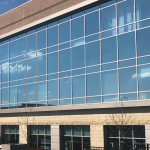Rethinking retail by loving local
An office building used to just be an office building. Straight-forward, clear purpose, simple. But like so many evolutions in retail leasing and commercial real estate, an office building is becoming much more these days.
Over the last 15 years or so, cities increasingly have begun requiring new office developments to include first-floor retail leasing—which not only improves life for the tenants but also increases foot traffic to the neighborhood and sales tax to the city coffers.
At first, developers sought reliable national chains – a Starbuck’s here, a Jimmy John’s there – to add food and beverage options and increase the amenities for prospective tenants. With strong credit, reliable track records and better capital, these well-known choices were, for the most part, a safe bet. Plus, the fit-out costs for these spaces were often substantial, and few developers wanted to risk that kind of investment on an unknown.
It wasn’t long, however, before developers realized how demanding and inflexible some of these retail tenants could be. At the same time, office tenants became a little more selective, wanting retail that not only appealed to their tastes but also reinforced the brand of the building and their individual company.
Mixing the right retail leasing recipe
These two converging forces have marked a major shift in retail leasing, both nationwide as well as here in Kansas City. The popularity decline of national chain retail tenants and the increasing focus on local small businesses are forcing developers to rethink the best ways to enhance the overall offering of the property.
Skip Stone elaborates on the shift in Development Magazine from NAIOP:
“That caused some developers to think less about the credit they were getting on that 1,500-square-foot space; instead, they began to think of retail more like any other amenity in which they would invest, such as gyms, better elevators or showers and locker rooms. With this change in perspective on their TI investment, some decided to turn their attention to attracting the kind of local and character-filled retail spaces that tenants were requesting.”
Here in Kansas City, we’ve been seeing this shift toward local for a while now. Of course, developers still must consider the risk of a mom-and-pop, still need to evaluate the financial profiles and assess the store’s future business prospects. But many are finding a happy medium by partnering with local businesses who are slightly more established and ready to expand. They get the energy and the KC cred of helping a local entrepreneur grow, while also feeling confident in the company’s future.
David Popp explains in CIRE Magazine why this shift to a more diverse tenant mix is a good thing:
“Too many neighborhood and convenience centers are languishing in marginal return mediocrity with occupancies hovering between 70 percent and 85 percent. To realize the full economic potential of these assets, those stubborn 1,000- to 2,500-square-foot vacancies must be aggressively marketed to enterprises that can pay market rents, complement the tenant mix, and add measurable value to the property. Often, the right kind of mom-and-pop tenant fills this role, making the difference between minimal and exceptional return.”
The local KC flavor
The payoff from this kind of diversification can be substantial. Solid tenants can add to the property’s intrinsic value, but developers should also keep in mind how much value may be added to the market-driven cap rate based solely on the perceived appeal of the names on the sign.
And that perception is huge, especially when it affects the overall character of the neighborhood. After leaning heavily on national restaurant and retail chains, for example, the Country Club Plaza is starting to add more local flavor, including the new Hogshead and Parkway Social Kitchen restaurants and the new Made in KC store, which is a great example of a solid local company in major expansion mode. And the River Market wouldn’t feel the same with a Baskin-Robbins, but a new location of Betty Rae’s fits in perfectly.
Choosing local also helps build more of a true partnership between office landlords and their retail leasing tenants, which produces stronger results for the entire property. Especially in Kansas City, that sense of community can be a huge driver of success.
We love working with local businesses, especially those in growth mode looking for their next location. They often need a little more assistance because they don’t usually have the internal resources to handle that kind of transaction. We’re currently working with a number of local operators for the new City Center Lenexa development, connecting these prospective tenants with an architect and an estimator and helping them through the entire process. On the tenant representation side of business, we’re even helping one client pursue necessary parking variances and city approvals. Yes, it’s above and beyond the typical broker services, but there’s nothing more satisfying than witnessing a full lobby of customers inside a retail client you helped.
From the time of that first call to the moment we’re opening the doors of a new location, we stay in lockstep with our retail leasing clients. We realize that an office building is no longer just an office building, and local retailers are a big reason why we love this town in the first place!
Erin Johnston is vice president of retail brokerage at Copaken Brooks, a full-service commercial real estate firm headquartered in Kansas City and serving the Midwest. The company’s full suite of services includes: leasing (office, medical, retail and industrial), investment acquisition and sales, tenant representation and HQ relocations, condo management, property management, asset management, development, and construction management. Share your thoughts on our Facebook page or on Twitter @CopakenBrooks.








